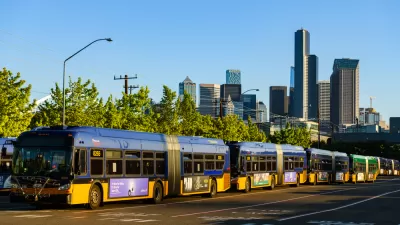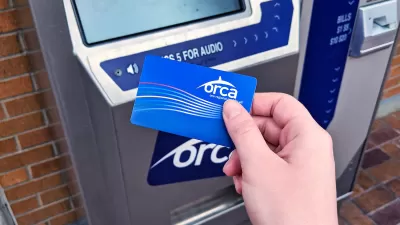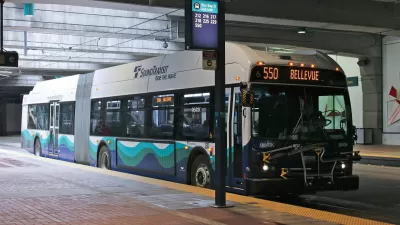A bill currently on Governor Newsom’s desk would replace punitive measures with more equitable and compassionate approaches to fare enforcement.

In an opinion piece for Streetsblog California, Haleema Bharoocha questions the policy of fining people who evade fares on public transit higher fees than people who speed in their cars.
California law punishes a failure to pay a bus or train fare with a $250 to $400 fine, a hefty amount for many of the state’s residents, as well as a misdemeanor criminal charge and potential jail time. “The juxtaposition with other types of violations within the state's legal framework is telling. Consider, for instance, traffic violations such as speeding or having an expired vehicle registration. These offenses do not carry the same severe criminal consequences as fare evasion. Instead, they typically result in the imposition of monetary fines.”
For Bharoocha, “The need for a reevaluation of this system is evident when we consider the relative levels of danger posed by infractions such as fare evasion.”
Bharoocha argues that fare enforcement disproportionately impacts minority and low-income riders, and can sometimes turn deadly during confrontations with law enforcement. Moreover, fare enforcement “diverts resources from vital safety concerns” and places a strain on local courts and administrative entities.
“In a state that prides itself on progressive ideals, we must confront the fact that these punitive measures perpetuate inequality and discrimination. These injustices are not isolated but systemic, demanding immediate attention.” Assembly Bill 819, now on the governor’s desk, offers an opportunity to decriminalize fare evasion statewide and institute more equitable, compassionate approaches.
FULL STORY: Op-Ed: Why Is Fare Evasion Punished More Severely than Speeding?

Planetizen Federal Action Tracker
A weekly monitor of how Trump’s orders and actions are impacting planners and planning in America.

Maui's Vacation Rental Debate Turns Ugly
Verbal attacks, misinformation campaigns and fistfights plague a high-stakes debate to convert thousands of vacation rentals into long-term housing.

San Francisco Suspends Traffic Calming Amidst Record Deaths
Citing “a challenging fiscal landscape,” the city will cease the program on the heels of 42 traffic deaths, including 24 pedestrians.

Amtrak Rolls Out New Orleans to Alabama “Mardi Gras” Train
The new service will operate morning and evening departures between Mobile and New Orleans.

The Subversive Car-Free Guide to Trump's Great American Road Trip
Car-free ways to access Chicagoland’s best tourist attractions.

San Antonio and Austin are Fusing Into one Massive Megaregion
The region spanning the two central Texas cities is growing fast, posing challenges for local infrastructure and water supplies.
Urban Design for Planners 1: Software Tools
This six-course series explores essential urban design concepts using open source software and equips planners with the tools they need to participate fully in the urban design process.
Planning for Universal Design
Learn the tools for implementing Universal Design in planning regulations.
Heyer Gruel & Associates PA
JM Goldson LLC
Custer County Colorado
City of Camden Redevelopment Agency
City of Astoria
Transportation Research & Education Center (TREC) at Portland State University
Jefferson Parish Government
Camden Redevelopment Agency
City of Claremont





























